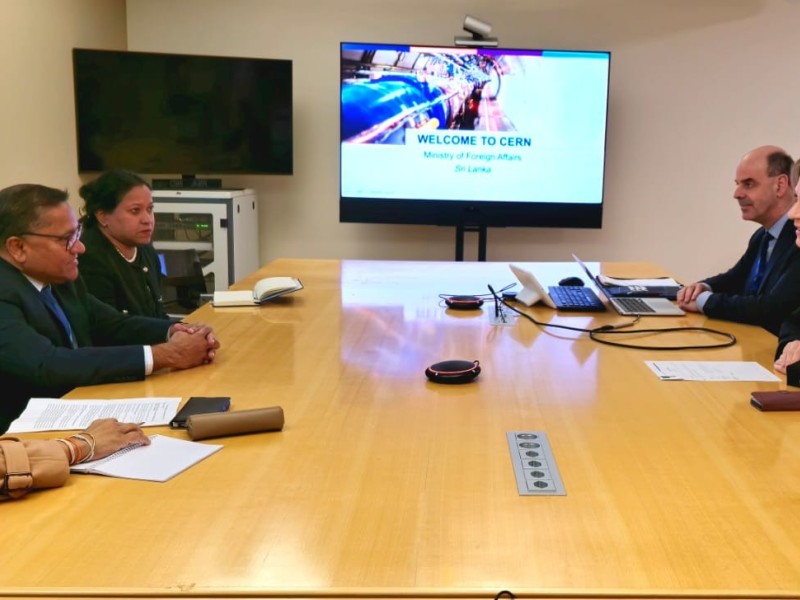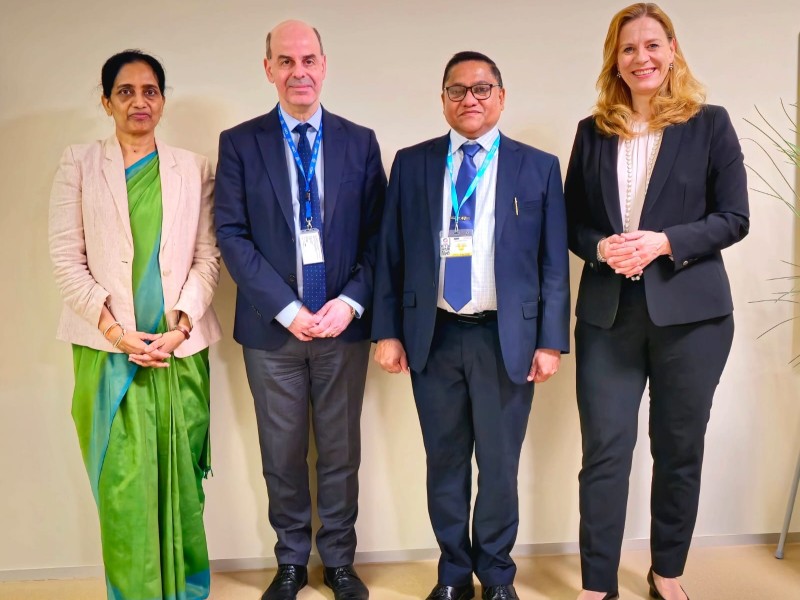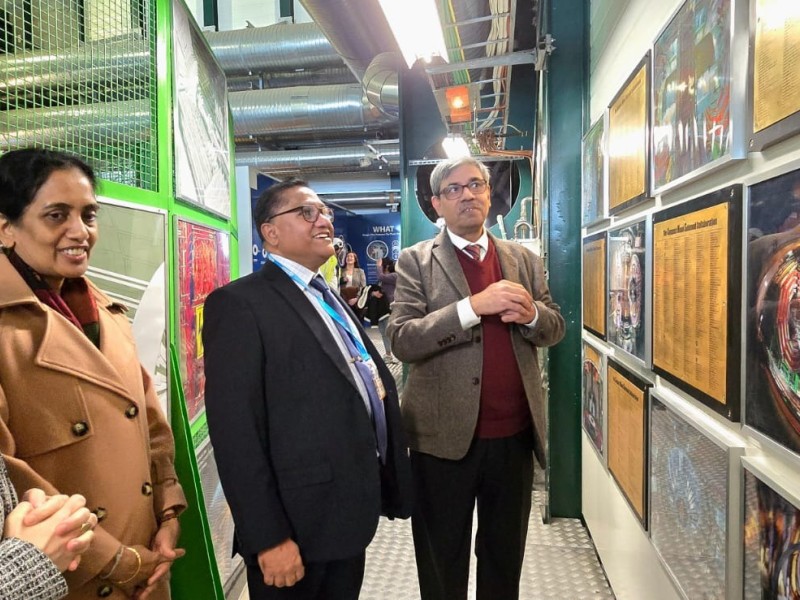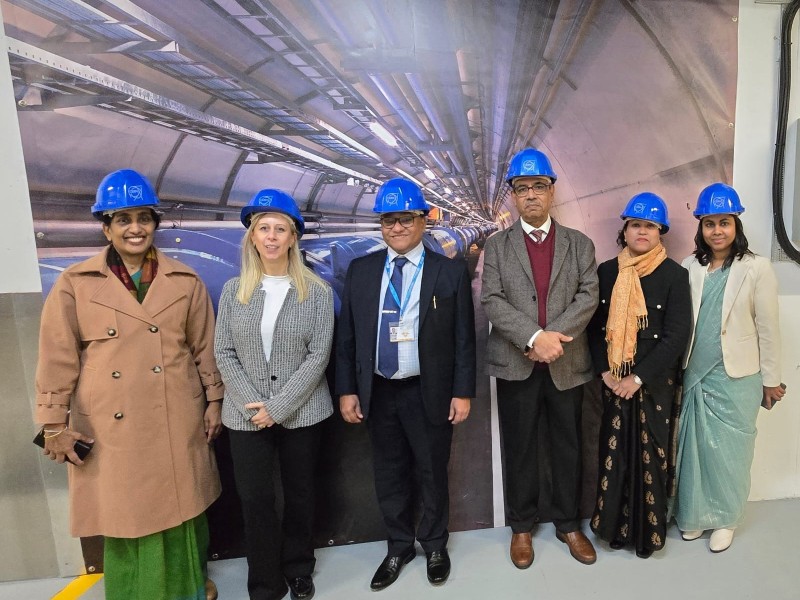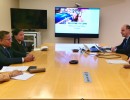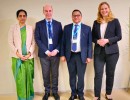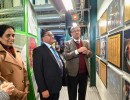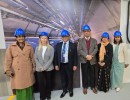
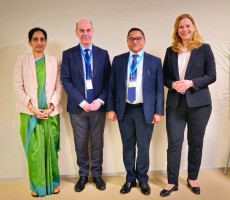
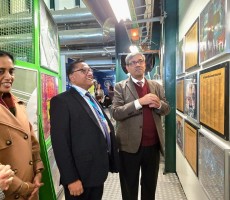
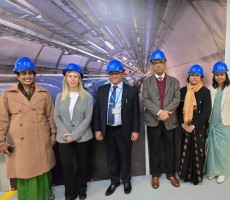
On 26 February 2025, Hon. Vijitha Herath, Minister of Foreign Affairs, Foreign Employment and Tourism, visited the European Organization for Nuclear Research (CERN). Hon. Minister met Ms. Charlotte Warakaulle, Director of International Relations and Prof. Emmanuel Tsesmelis, Head of Non-Member State Relations during the visit and explored future opportunities for Sri Lankan students, academics and scientists to contribute to experiments and research work with CERN while reinvigorating Sri Lanka’s collaboration with CERN.
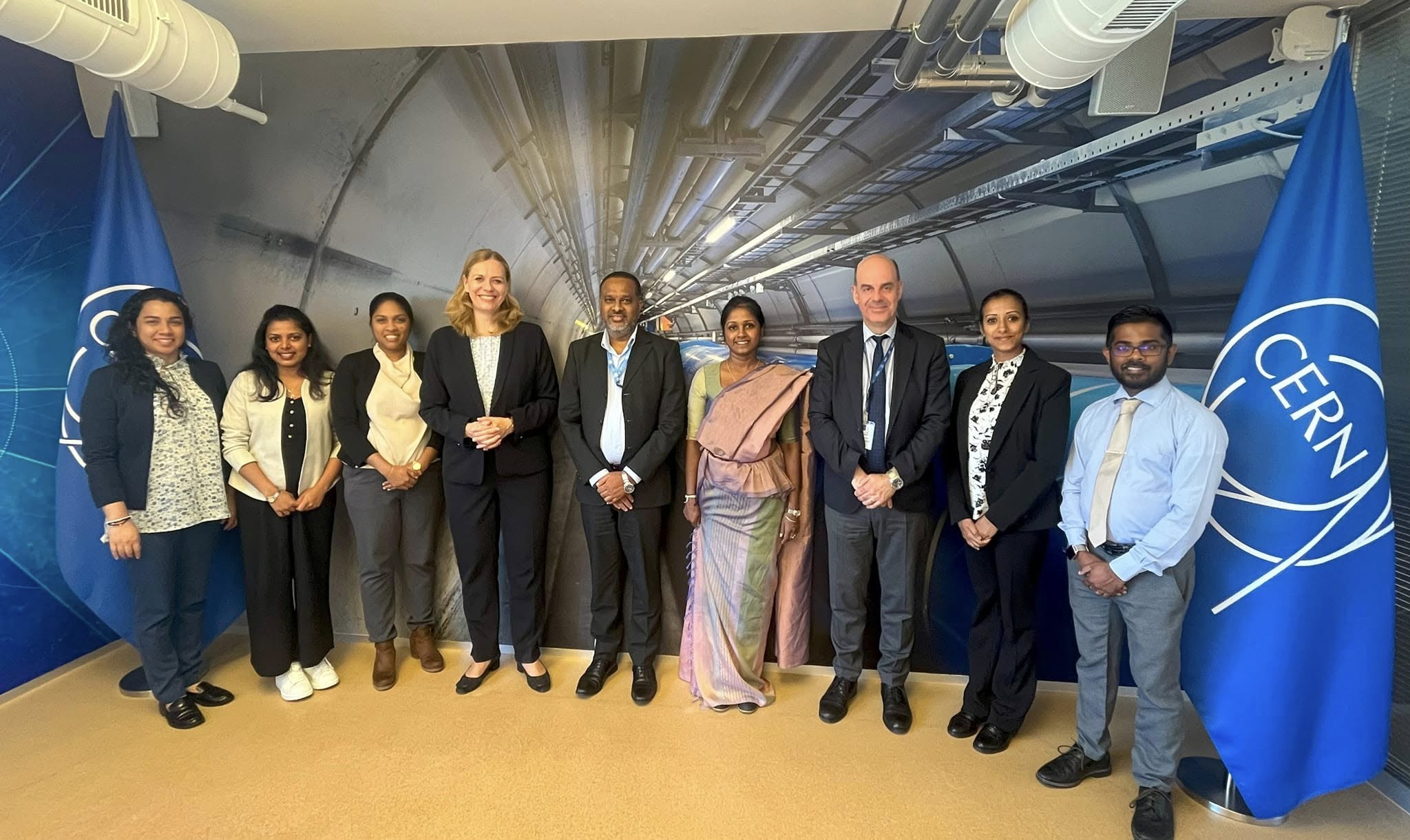
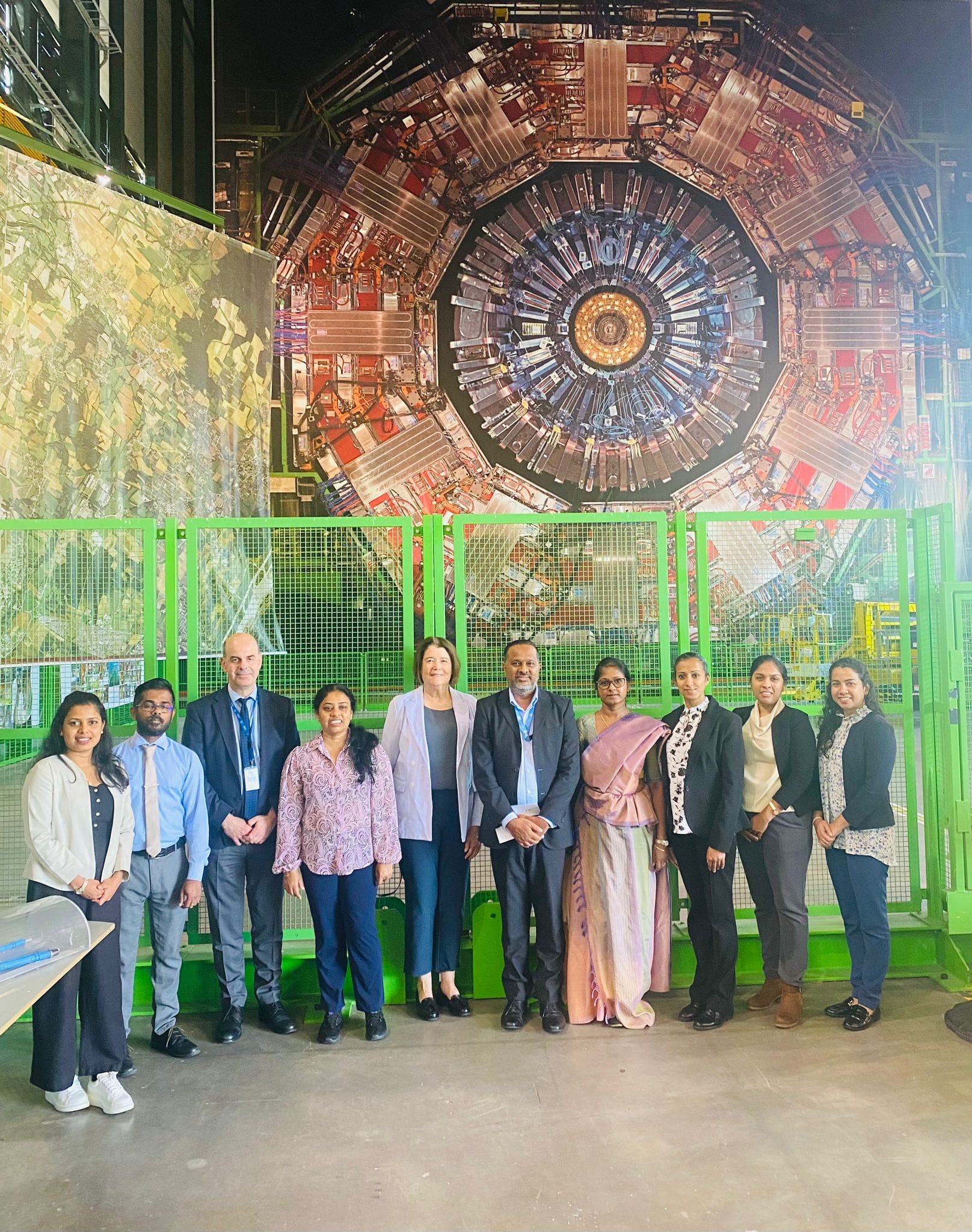
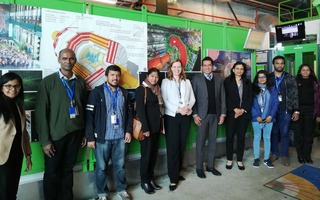
The Minister of Science, Technology and Research Sujeewa Senasinghe, during his visit to Geneva on 17 May 2019, extended an invitation to the European Organization for Nuclear Research (CERN) to participate in the Shilpa Sena exposition to be launched in July 2019 in Colombo. The exposition will provide an excellent platform for CERN and Sri Lanka to showcase the ongoing collaboration, and its potential for advancement of science in Sri Lanka. It would help create awareness and interest among students on the importance of high energy physics for Sri Lanka, stated Minister Senasinghe.
Welcoming the Minister and the Sri Lanka delegation, Ms. Charlotte Warakaulle, Director for International Relations highlighted Sri Lanka's expanding engagement with CERN over the past several years. She appreciated the Ministry of Science, Technology and Research for hosting the 2nd edition of the South Asian High Energy Physics Workshop on Detector Technology and Application in February this year.

"Shilpa Sena", a rolling exposition will be launched island wide in July, geared towards bringing technological skills, knowledge and products to the general public, at a time when the country embraces new and emerging technologies. The aim of the exposition is to bridge the technological divide in the society while ensuring that no one will be left behind, as part of the government's wider policy of achieving 2030 Sustainable Development Agenda. Minister of Science, Technology and Research Sujeewa Senasinghe made these remarks addressing the High-Level Round Table on "The impact of rapid technological change on sustainable development" on 14 May 2019 while participating in the 22nd Session of the Commission on Science and Technology for Development (CSTD). The theme of this year's Commission was "The role of science, technology and innovation in empowering people and in ensuring inclusiveness and equality" and saw the participation of developing countries from Asia, Africa and Latin America as well as developed countries.
Speaking further, Minister Senasinghe stated that Nanotechnology, Biotechnology, Neurotechnology, 5G and Internet of Things, Personalised Medicine, Blue-green Technologies, New Energy, Robotics and Industrial Automation, Mechatronics, Artificial Intelligence and Space Technology have been identified as priority technology themes by the government for action. Highlighting the importance of Blue-Green economy, he stated that the objective of this initiative is to utilize ocean resources through enhanced scientific knowledge while drawing from Sri Lanka's rich heritage of indigenous knowledge.
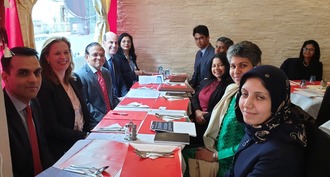
At a luncheon gathering today (30.01.2019) of European Organization for Nuclear Physics (CERN) representatives & South Asian diplomats hosted by Sri Lanka, Ambassador Azeez emphasized the importance of networking between South Asian scientific community and CERN, as well as among scientific communities in the wider region. He said this would enable scientific advances to enhance South Asian countries' individual and collective capacities to contribute to the effective realization of SDGs and the empowerment of all people.
The second South Asian High Energy Instrumentation Workshop (SAHEPI - 2) will take place in Sri Lanka from 20 - 21 February 2019, co-hosted by Ministry Science, Technology and Research and CERN.
Permanent Mission of Sri Lanka
Geneva
30th January 2018
“Developing strategies to meet the emerging and disruptive technologies so as to become competitive regionally and globally is an important priority for Sri Lanka”, stated the Minister of Science, Technology and Research, Skills Development and Vocational Training and Kandyan Heritage Dr. Sarath Amunugama, participating at the 21st Session of the Commission on Science and Technology for Development (CSTD) held in Geneva from 14-18 May 2018.
Addressing the high level round table on “impact of rapid technological change on the achievement of sustainable development goals”, the Minister elaborated the various challenges faced by developing countries, which hindered the positive impact of rapid technological changes in achieving sustainable development goals. He underlined the need for comprehensive studies on hazards as well as on the negative impact of new and emerging technologies on industries, and stressed the importance of leveraging technologies that had the potential for increased market share and competitiveness.

“The ongoing Sri Lanka-CERN cooperation could be further enhanced by involving other technical universities including in the engineering and information technology fields in the coming years”, said Minister of Science, Technology and Research, Skills Development and Vocational Training and Kandyan Heritage Dr. Sarath Amunugama at a discussion held with Ms. Charlotte Warakaulle, Director for International Relations, European Organization for Nuclear Research (CERN) in Geneva, during his visit to the CERN on 15 May 2018. Sri Lanka – CERN partnership has recorded considerable increase in the participation of doctoral candidates and physicists in critical particle physics experiments of CERN.
While commending CERN for enhanced cooperation with Sri Lanka during the past few years, the Minister emphasized the importance of the involvement of undergraduates, PhD candidates as well as scientists in CERN experiments. Ms. Warakaulle stated that such exposures would provide an important opportunity to bring back to Sri Lanka not only the much needed knowledge on particle physics but also useful insights in the latest advancements in high technology. Access to data generated in the experiments, would be extremely useful for universities to broaden their research capacities as well as for potential use in industries, she stressed.
It was agreed that collaboration would continue in the form of training for Sri Lankan physicists and students in CERN experiments as well as in various other CERN programmes such as the prestigious ‘Summer Student Programme’, paving the way for building the critical mass of scientific expertise in Sri Lanka in the field of high energy particle physics.

